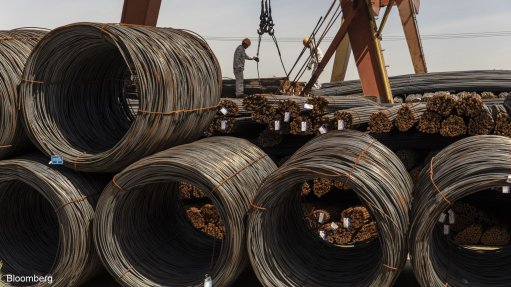Unearthing Africa's mining potential: the case for South African training companies as local partners
This article has been supplied.
By Jacques Farmer, Managing Director at PRISMA Training
In the African mining sector, the quest for local partnerships is driven by a combination of regulatory requirements and the desire to empower indigenous communities. However, the challenge lies in bridging the skills and expertise gap that often exists within these local partnerships. As African countries seek to maximise their mining potential, considering South African training companies as key local partners can be a strategic move with profound benefits.
South Africa's rich mining legacy: over a century of expertise
South Africa blends both legacy and modern practices and the nation's mining industry, steeped in a history that spans more than 150 years, has evolved into a benchmark for global mining standards. African countries, particularly those in emerging markets like West Africa's Ghana, stand to gain significantly by accrediting South African training companies in their mining projects. The transfer of industry best practices from South African training partners to local companies addresses the crucial skills development objectives mandated by mining projects. This collaboration provides a unique opportunity for emerging markets to establish mining beneficiation programmes that make a tangible impact on their economic development.
Challenges in current training practices across Africa
Unfortunately, the existing training landscape in some African markets lacks a structured and comprehensive approach and many African countries look to established mining nations such as Australia, or Canada for guidance in training and development within the mining sector. Training programmes are often loosely oriented, with a primary focus on meeting minimum standards and qualifications. This approach may lead to inadequately trained individuals entering the mining workforce, posing risks to both safety and operational efficiency.
Anecdotal evidence suggests instances of individuals transitioning from unrelated professions, such as rice farming, to operating heavy machinery with minimal training. This highlights the need for a more rigorous and competency-based training approach to ensure not only job qualification but also the safety and well-being of workers within the mining sector.
The South African advantage: human capital development and competency training
South African training providers distinguish themselves by adhering to rigorous regulations and standards that align with those of first-world countries. The Mining Qualifications Authority, with its 150 years of experience, plays a critical role in shaping the nation's mining training landscape. South African training is characterised by a human capital development-oriented approach that focuses on competency training and assessments.
Training modules encompass not only theoretical aspects but also practical components and on-site workplace integration. This ensures that individuals not only acquire theoretical knowledge but also gain hands-on experience within the mining environment before receiving certification. Reputable South African training providers can guarantee a comprehensive learning experience that clearly addresses the gap in current training practices observed in some African markets.
Overcoming challenges and changing perceptions
While there may be initial scepticism or stereotypical thinking regarding the capabilities of South African training providers, it is essential to dispel such notions. South African companies bring not only expertise on par with global standards but also a cultural understanding that resonates with their African counterparts. Overcoming the perception that training from South Africa may be inferior is essential to maximise the true potential of local partnerships.
Addressing the lack of perceived career paths within the mining industry for locals is another challenge that South African training providers aim to tackle. By offering comprehensive training programmes and fostering a mindset shift, these providers seek to empower local communities, enabling them to envision long-term careers within the mining sector and gain employability for life.
Cost-effectiveness and quality assurance
Choosing South African training providers over global counterparts presents a compelling economic advantage. The favourable exchange rate of the South African Rand against currencies like the Australian Dollar or the Canadian Dollar makes training programmes not only more cost-effective but also highly competitive for African mining corporations. However, the emphasis should not solely be on cost; the quality of training provided by South African companies is comparable, if not superior, to that offered by their global counterparts.
Equipping Africa’s mining sector for safety and effectiveness
South Africa stands ready to provide benchmarked and best-practice training solutions to global standards, offering cost-effective alternatives while ensuring excellence in efficiency, safety, and development. Positioned as an ideal local partner within Africa, South Africa, particularly in human capital development, holds the ticket to empowering local mining houses and communities for safe and effective operations. South African training providers are dedicated to entering African markets, fostering relationships, and facilitating skills transfer, with the aim of enabling local communities to independently sustain their training and development initiatives. As such, embracing South African training companies as local partners represents a strategic move towards unearthing Africa's mining potential, addressing skills gaps, fostering local partnerships, and contributing to a sustainable and prosperous future for the African mining sector.
Article Enquiry
Email Article
Save Article
Feedback
To advertise email advertising@creamermedia.co.za or click here
Press Office
Announcements
What's On
Subscribe to improve your user experience...
Option 1 (equivalent of R125 a month):
Receive a weekly copy of Creamer Media's Engineering News & Mining Weekly magazine
(print copy for those in South Africa and e-magazine for those outside of South Africa)
Receive daily email newsletters
Access to full search results
Access archive of magazine back copies
Access to Projects in Progress
Access to ONE Research Report of your choice in PDF format
Option 2 (equivalent of R375 a month):
All benefits from Option 1
PLUS
Access to Creamer Media's Research Channel Africa for ALL Research Reports, in PDF format, on various industrial and mining sectors
including Electricity; Water; Energy Transition; Hydrogen; Roads, Rail and Ports; Coal; Gold; Platinum; Battery Metals; etc.
Already a subscriber?
Forgotten your password?
Receive weekly copy of Creamer Media's Engineering News & Mining Weekly magazine (print copy for those in South Africa and e-magazine for those outside of South Africa)
➕
Recieve daily email newsletters
➕
Access to full search results
➕
Access archive of magazine back copies
➕
Access to Projects in Progress
➕
Access to ONE Research Report of your choice in PDF format
RESEARCH CHANNEL AFRICA
R4500 (equivalent of R375 a month)
SUBSCRIBEAll benefits from Option 1
➕
Access to Creamer Media's Research Channel Africa for ALL Research Reports on various industrial and mining sectors, in PDF format, including on:
Electricity
➕
Water
➕
Energy Transition
➕
Hydrogen
➕
Roads, Rail and Ports
➕
Coal
➕
Gold
➕
Platinum
➕
Battery Metals
➕
etc.
Receive all benefits from Option 1 or Option 2 delivered to numerous people at your company
➕
Multiple User names and Passwords for simultaneous log-ins
➕
Intranet integration access to all in your organisation





















